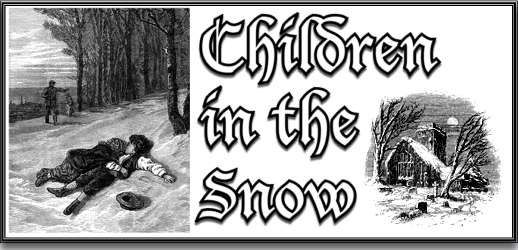
The incident which the following lines describe occurred in the winter of 1820 and involves two farm apprentice boys who became lost in a snow-storm whilst travelling across Dartmoor. It is very similar to the story of the Brad Stones and may well refer to the same lads.
Ye who in childhood e’er have wept
To hear the tale, of melting power,
Of that young orphan pair who slept
The sleep of death in greenwood bower,
Oh list my lay – though over them
Far sweeter dirge the redbreast sung-
And be my meed the diamond gem
From Pity’s sacred fountain sprung.
Where over Devon’s vales and Woods
Bleak Dartmoor lifts her summits stern,
And rivers pour their infant floods
Through granite wastes of furze and fen,
Deep in a rudely cultured nook
(Hard by where Dart’s red waters boil)
A peasant dwelt, in heart and look
Well sorted with that savage soil.
Beneath his roof two pauper boys
Were bound to earn their daily bread,
Poor exiles from domestic joys,
Who scarce had where to lay their head.
No parents eye long, long had smiled
On them to own affection’s claim:
One was a homeless orphan child,
And one the nameless pledge of shame.
In cloudless gold the morning shone
On Widdecombe’s dark belt of hills,
And gilt her tower the winter sun,
And sparkled in her frozen rills;
The holy peal of Sabbath bells
Proclaimed the solemn hour of prayer,
And echoing o’er the moorland dells
Aroused the straggling hamlets there.
And with the rest those children joined
The sacred work of praise and prayer,
Nor dreamed how few brief days might find
There limbs beneath that cold turf there.-
As home they turned at evening fall,
The heaven, erewhile so fair, grew brown;
And glimmering through a misty pall
The moon in sickly white shone down.
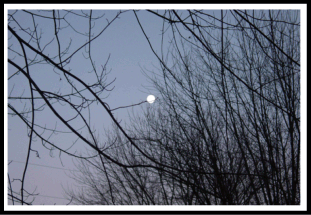
That night some sheep forsook the fold,
O’er the broad heath at large they roam;
And they must search the weary wold
At morn, to bring the wanderers home:
Their tattered garb they round them flung,
Their stinted meal in haste they took,
And o’er that gloomy threshold sprung,
Nor cast behind them one parting look.
Even then some dense and drizzling flakes
Fell sullen from the swarthy sky,
And strange dead silence lulled the brakes,
Prophetic of the snow-fall nigh:
Yet forth they fared – for well they knew
The wretch who bade them search the wold –
Though dun with plumes the thronged air grew,
And numbed their limbs and hearts with cold.
Vain was there search – yet on they passed,
Though heavier still the storm closed round,
And, through the dizzy air shower’d fast
The white fleece piled the wildering ground.
Too late they seek the homeward way –
They blindly roam the waste forlorn!
Still side by side the pale boys stray,
With terror mute, with suffering worn.
With faint, slow steps, the weary hour,
They toiled through snows o’er down and dell,
While round them still the wavery shower
Shadowing the air, incessant fell,
It covered all the mountain floods,
It ermined all the dark-brown moor.
Some choked were Spitchwick’s massive woods
And soared in snow the Hazel Tor.
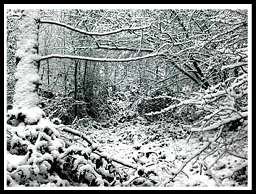
At length, less dense the darkening cloud
Hangs, and the flakes relenting fall,
While, burning through his western shroud,
The blood-red sun illumines all.
Alas, for them it shone in vain –
Too late the clouds less fiercely pour –
Long had they sunk upon the plain,
To sleep, and wake to grief no more.
Where the lone Moor o’er looked a dell,
And shewed the full Dart foaming by,
They wept to every hope farewell,
And laid them down alone to die:-
There did they sleep away their breath,
On that bleak death-bed waste and wild –
There stiffening on the wintry heath,
The snow-fall wrapped each friendless child.
And deep their sleep, though no fond eye
Was near to soothe the parting hour,
No mother’s arm of love was nigh,
No father watched his fading flower.
Closed is their span of earthly years Their path of mortal care is trod;
Life was to them a vale of tears,
And they have passed from it to God.
Oh glorious was the mournful hour,
When sunset lit their graves of snows,
And o’er the heaths of bleak Dartmoor,
The Torrs in blood-red splendour rose!
As o’er consuming Beauty’s hand
Of ivory pale, the dark veins flow,-
So, through the white and glittering land,
The river streamed below.
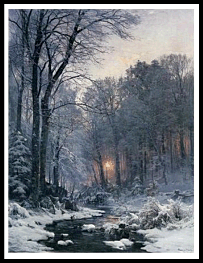
But henceforth on each poor boy’s ear
In vain the wintry stream may rave;
And all in vain, through green brakes near,
May murmur deep the summer wave.
Nought fear they now of want or scorn,
Of blows or wrongs their only hire –
No more to hail the dear May morn,
Or crowd around the Christmas fire.
Sad was the sight, when from their home,
Was slowly borne each coffined boy,
To rest in distant Widdecombe,
With many a pitying helper nigh:
Strange was the scene o’er the waste
Of dazzling snow the dark train wound,
Until each little corpse was placed
With pious toil in holy ground.
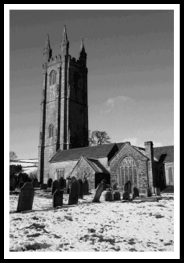
Ne’er with a tone so stern and dread
The burial bell its warning rung,
As o’er the snows with sunset red,
It then its awful burden swung;
The winds that howled o’er many a heap
Of sleet-drift, drowned the funeral prayer;
But Oh! they slept so calm and deep
The blighted flowers reposing there.
Ye who have heard these children’s fall,
Should such any such your board maintain,
Think, think how little their all,
Nor wring their hearts for guilty gain.
Unfit their tender years to stem
The tide of grief and hardship too;
Then, Oh in pity smile on them,
And heaven mercy smile on you.
J. Johns – 1828
On the 9th of January 1820 the following report appeared in the local Exeter newspaper:
“Two apprentice boys who were sent last week by their master (a Mr Willis, of Lemonford, in the parish of Ashburton) to look for some cattle on Dartmoor, were unfortunately lost in the snow. One of them was found the same day, and was brought into a house, but died almost immediately; the other was not found until the following day and was of course quite dead. The master, who went to look for them, was also brought in insensible, and lay in that state for five or six hours, but recovered by rubbing. A Coroner’s inquest was held on them on Saturday; the Coroner (Mr Gribble of Ashburton) was also very nearly lost in going to the house where the boys lay, in the parish of Widdecombe. He was obliged to leave his horse, of which at one time the only part appearing was his head, at a farm-house on the outskirts of the moor and walk four or five miles through deep snow to get to the house. Indeed some farmers in the neighbourhood of Dartmoor say the snow is deeper on the moor than it was in the severe winter of six years ago.”
 Legendary Dartmoor The many aspects past and present of Dartmoor
Legendary Dartmoor The many aspects past and present of Dartmoor
